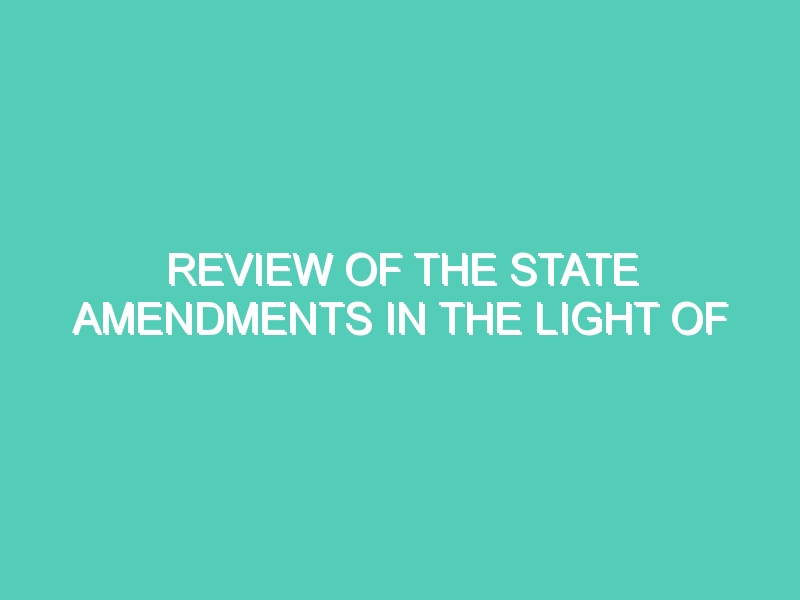India has been very conscious regarding its rightsguaranteed to its citizens and as per the living document philosophy, has tried to make adjustmentsaccordingly to provide the maximum respite to its citizens and give a broad interpretation to the legislations. However, there are certain fallbacks which are taken as advantage by many enterprises, politicians, and even those who have been elected by the people to rule the state etc.These people or enterprises have considered labour as their means to exploitation with deriving maximum benefits with a minimum pay out. Moreover, they have made efforts to supress the movements of these labour forces but have been unsuccessful to do as trade unions were present which helped in an organized and disciplined labourwork force and presentation of their demands in an organized manner of their workforce from time to time. However, since the lockdown, the States have taken this opportunity to suspend many of the labour laws to deny them of their rights. This article aims to analyse such decisions taken by some states in the light of pandemic and the various restrictions imposed on them being arbitrary in nature.
The Government of India imposed a nation-wide lockdown in March as a precaution from the spread of the pandemic virus of COVID-19[1]. The government imposed curfew timings on nation with suspension of activities extending to almost all sectors, resulting in a loss of jobs of many people at a mass level, majorly impacting the migrant workers and daily wage labourers who came to big cities in a hope of a better future. Though the Ministry of Labour and Employment has released an advisory for not terminating their employee’s contracts and to adhere to their payment requirements including salary and wages[2], very little has been implemented by the companies and organizations nation-wide. Along with loss of jobs, there have been massive pay cuts and layoffs both in formal and informal sector. Though there has been very little effort shown by the Central Government in the initial phases of lockdown towards the labourers and workers class, the State Governmentson the other hand, have rather opted the route for a more deteriorating life for the mentioned class. Various State governments have started introducing amendments into the labour laws to deny the workers of their rights.
Labour laws falls under the category of Concurrent List of the Constitution where both the Parliament as well as the State Legislatures can make laws subject to President’s sanction as per Article 213(1) and 254(2)[3]. These articles clearly state that any bill in relation to the concurrent list, it needs the President’s approval for enactment and providing legitimacy[4]. Many states including Uttar Pradesh (UP), Madhya Pradesh (MP), Rajasthan, Gujarat, Odisha, Punjab etc. have come up with ordinances which have aimed to provide more flexibility to businesses and employers regarding the adherence to these laws. The UP Government have come with its own ordinance which exempts the compliance of the labour laws for a period of three years[5]. Such exemptions are applicable for all factories and establishments engaged in the manufacturing process. Such exemptions extend to all the major labour laws which prevail in India except the most fundamental ones, that being the Factories Act, Child Labour (Prohibition and Regulation) Act, Maternity Benefit Act, Employee Compensation Act, Equal Renumeration Act, Bonded Labour (Abolition) Act and the Payment of Wages Act (depending on state-to-state released ordinance). However, subject to certain riders, the exemption does not encompass the rules of basic requirement of payment of minimum wages, timely payments, welfare of the employee in terms of safety and security etc. Basically, the State has provided for the suspension of rights of workers with respect to trade unions, contract workers, industrial disputes, practices of hiring and firing, policies regarding job protection etc. for a period of three years.
The MP Government, on the other hand have amended the Industrial Disputes Act, 1947 for a period of 1000 days i.e. 3years subject to the conditions that adequate provisions are made by the industries regarding the employed workmen and settlement of the disputes which arise during the course[6]. It has also made necessary changes with respect to the same for the statutes such as Factories Act, 1948 and the Rules. Additionally, Gujarat has also laid down the same exemptions in relation to the Factories Act regarding weekly hours, intervals for rest etc. for a considerable amount of time. Other states including Rajasthan, Punjab, Odisha, and Himachal Pradesh too, in furtherance to the exemptions, have imposed the extension of minimum working hours for at least three months[7]. Majorly the states who have brought amendments into the labour laws have extended the working hours to 12 hours per day and 72 hours per week as compared to the earlier requirements which were 8 hours per day and 48 hours per week. Such overlooking of the rights in the domain of ‘an extraordinary situation’ and the necessity to provide concessions to industries and factories[8] at the cost of the mass population of workers and labourers isn’t justified on the part of the workers who now are being exploited and basically being deprived of rights.The notions as per the guidelines framed by the International Labour Organization (ILO) on the labour and worker rights to prevent them from being exploited have been clearly violated. The fixation of eight hours as per day was a much tough struggle since the 19th century by the ILO to keep it as the standard[9]. However, the government taking the ‘pandemic’ has granted the opportunity to the various factories, businesses, industries etc. to exploit the workers and the labourers and reduce them to slavery by making them work for more hours and threaten their health and safety. Such passing off the amendments will also lead to have a gender effect as per Dr. K.R. ShyamSundar who has critiqued the changes made in the laws by the State in his book[10]. The amendments will lead to have a more male-dominated sector of workers as per the new order of working hours i.e. 12 hours per day. Women workers considering their domestic chores and travel safety would prefer less to work now due to the increased working hours and thus would lead to a drop in the gender ratio employed as labourers in the factories. This traditionally goes against the claim made by the ILO stating to have a much better work-life balance, gender equality, productivity, ensuring health and welfare of the workers and having an efficient hour of working.Furthermore, the International Trade Union Confederation (IUTC) Global Rights Index has rated India with a ‘5’ signifying ‘no guarantee of rights.’[11]
THE CASE OF MADHYA PRADESH AND UTTAR PRADESH
MP and UP have been the fore front runners for implementing the changes in the labour laws making it hard on the workers. The UP Government, though providing for safety and welfare of the employees and workers, has explicitly ignored and suspended the adherence to Chapter III of the Factories Act which states the condition of workplace and also provides for regulation[12]. It is a known fact that many of the workers and labourers work in factories involving dust and fumes, which are harmful for one’s health and body parts severely harming their bodies physically and mentally. Though the government have ruled that provisions relating to safety and health of the workers will be applied and complied to, it becomes quite ironic as they increase the working hours to 12 hours per day as mentioned above. Above all that, it has also made provisions for timely payment of the wages for the tenue of the work done. Similarly, the MP Government has neglected the provisions pertaining to the security of the workers and labourers at workplace as mentioned in the Industries Disputes Act, 1947[13]. It has exempted all the factories from complying with the provisions of the said act. The implication of passing such amendments will be granting a lot more flexibility to the employers to have firing the workers without paying them any compensation. They would have no payment obligations more than the minimum wage for the tenure they have been employed. As per the ordinance, the employers may not have any negotiation with the trade unions over their concerns, thereby making them unaccountable from addressing any grievances. The rights ranging from formation of trade unions to decent workplace conditions to ensuring welfare and security of the workers to adherence to the established standard of working hours to unfair and arbitrary laying off the workers to ensuring of the provisions for gratuity and other benefits under their contract etc. will be suspended and can be highly used by the employers against the worker’s rights which they generally possess or inherit.The suspension of such laws leads to the weakening of the formal sector market and with such policies being neglected, there will be an increase in the supply of labour as people would emerge into the informal sector, making it more difficult for the already troubled workers and labourers, eventually leading to lower wages.
As per Bloomberg, many other countries, unlike India are trying to rather minimize the layoffs in this period of crisis by providing wage subsidy to keep engaging the workers[14]. These subsidies represent a significant part of relief causing less distress and displacement on the part of the workers. There has been a major gap in the ideologies by these countries with India, where employers with the support of these exemptions, in some cases are urging the state governments to restrict the migrant labourers back to their villages for their availability[15]. There lies the difference between the strategies and the ideologies from countries such as United States, Argentina, Malaysia, Canada, Australia, New Zealand etc. as compared to that of India.
The exemptions being ‘awarded’ to the establishments are nothing but a source of distress for the workers making it terrifying for them to earn bread for them and their families. The suspension of the labour laws has led to acomplete anarchy in the labour market and as per sources, it is also predicted to replicate the decisions taken by the UP Government at the national level[16].The effect of such implementation of ‘draconian laws’ has activated the labour unions with a fear of turning them into slaves with the introduction of the new reforms.Though the intention has been to revive the economies and the establishments operating within it, few officials at the Ministry of Micro, Small and Medium Enterprises have not commented on whether such implementations will lead to an improvement and growth in the sectors[17]. Thus, with no direction ahead and clear achievement, it has a huge cost associated with it i.e. the labour market with their fundamental and human rights being infringed with little evidence to result in a boost for the sectors and have an increase in foreign investment.In a view to boost the economy and provide the various establishments with the requisite respite to provide a benefit to their enterprises. The workers and labourers are guaranteed with rights through the statutes to exercise their demands and entitlements which have been denied to them via the force of trade unions and de facto unions to have formal and organized strikes which extend even to the use of legal means in front of the judiciary via litigations.
While the government has amendments in favour of the enterprises, few of them have rather raised questions over such amendment, one of them being the Chambers of Commerce and Industry who have been pressing hard for a review of the labour laws as per the present times of the society which have been exposed to global competition. The provisions and chapters from Industrial Disputes Act and Contract Labour Act have been recognized as imposing restrictions on thefreedom on part of the labourers, resulting in a negative effect on growth of employment as well.Thus, as per the various labour unions and forces, the amendments must be reviewed in the light of termination of services, freedom to form unions for a more organized demand of their needsto complying the standards of ILO Conventions and the undue advantage given to the factory owners should be balanced to promote the intention of the labour law legislations which is to protect the safeguards of the working population and meeting of their basic interests.
INTERNATIONAL CONVENTIONS & STANDARDS
India being one of the founding members for the ILO back in 1922[18], has ratified manyconventions on various aspects of labour issues prevailing in the society which neglects various labour rights. India has always been a front runner to ensure the rights enshrined in the Constitution to the workers and make laws accordingly. However, on the same page, it has ignored the most fundamental conventions which are categorized by the ILO as freedom of association and the right to organize and collective bargaining[19]. Interestingly, India who claims to have a positive approach towards International Labour Standards[20]has ratified all the fundamental convention except these two which unlike others form the essence too[21].Apart from these, ILO has revealed various other conventions which India is yet to ratify in furtherance to the above rights[22]. Such non-ratification has raised concerns over the government’s accountability towards the class of workers. Now, the State Government coming up with the amendments and the ordinances as per standards set, didn’t consult the unions nor the establishment bodies over implementing the changes, violating the most core Tripartite Convention, 1976[23].It has already been stated how such violations have neglected the core struggle which was undertaken to implement the rules and by passing these ordinances, the States have just proven to worsen the situation and have been disrespectful to the decisions taken back them in the woes of ‘pandemic’.
CONCLUSION
The rights and freedoms guaranteed to such population via the Constitution and the various legislations should not be allowed to be given away and must possess a very high level of threshold to make exemptions on these laws, something which the states haven’t been able to justify. Their actions include the need for better job opportunities, boost to the sectors and attracting global investments on one hand, but at the same time, no discussions and inclusion of both the parties which gets affected have been taken into consideration. The State cannot via its own motion, arbitrarily take away the rights or for a matter even propose such amendments which the Centre again cannot approve of, considering the situation of migrant workers and other worker population amidst this time, especially when there are ratifications being made with International Labour Organization Conventions which is aimed to promote the accepted principles of freedom, equity, security and dignity. There must be mutual cooperation to benefit both the sides in the long-term productivity as done in other countries. However, taking the opposite route to repress more such movements and unrest between the workers under ‘pandemic’ will lead to more harm than benefit which the State Legislations intend to do.
Article Written By-Kushal Tekriwal
(HRDI Work From Home Internship)
[1]“COVID-19: Lockdown across India, in line with WHO guidance” UN News, March 24, 2020.
[2]“COVID-19: Ministry of Labour and Employment issues advisory against cutting salaries of employees” Business Standard, March 23, 2020.
[3]The Constitution of India, arts. 213(1), 254(2).
[4]Ibid.
[5] Prashant K. Nanda, “Uttar Pradesh invokes ordinance to exempt businesses from all key labour laws” Livemint,May 8,2020.
[6]Ashima Obhan& Bambi Bhalla, “India: Suspension of Labour Laws Amidst COvid-19” Mondaq, May 18, 2020.
[7]RamapriyaGopalkrishnan, “Changes in Labour Laws Will Turn the Clock Back by Over a Century” The Wire, May 20,2020.
[8]Gautam Chickermane& Rishi Agarwal, “Covid-19: Yogi Adityanath Attempts Reforms, Delivers Regulatory Chaos in UP” News 18, May 10,2020.
[9]International Labour Organization, “International Labour Standards on Working Time” Accessed from < https://www.ilo.org/global/standards/subjects-covered-by-international-labour-standards/working time/lang-en/index.htm#:~:text=These%20above%20two%20conventions%20set,of%20eight%20hour s%20per%20day>.
[10]Shyam K R Sundar and Rahul Suresh Sapkal, Labour Laws and Governance Reforms in the Post-Reform Period in India: Missing the Middle Ground?-Essays in Honour of Prof K P Chellaswamy, (Synergy Books India,New Delhi, 2019).
[11]International Trade Union Confederation, “2019 IUTC Global Rights Index: The World’s Worst Countries for Workers” (2019).
[12]Anya Bharat Ram, “Relaxation of labour laws across states” PRS Legislative Research, May 12, 2020, Accessed from <https://www.prsindia.org/theprsblog/relaxation-labour-laws-across-states>.
[13]The Madhya Pradesh Labour Laws (Amendment) Ordinance, 2020 (Ordinance No. 5 of 2020).
[14]Pranab Bardhan, “Labour Law Suspension: Hit The Workers When They Are Down” Bloomberg Quint, May 10, 2020.
[15]Ibid.
[16]“Lockdown-hit industry demand suspension of labour laws for 2-3 yrs” The Economic Times, May 8,2020.
[17]Adil Bhat, Suspension of Indian Labor Laws to Hurt Low-Income Workers” The Diplomat, June 23, 2020.
[18]International Labour Organization,“ILO in India” Accessed from <https://www.ilo.org/newdelhi/aboutus/WCMS_166809/lang–en/index.htm>.
[19]International Labour Organization, “Up-to-date Conventions and Protocols not ratified by India” Accessedfrom <https://www.ilo.org/dyn/normlex/en/f?p=1000:11210:0::NO:11210:P11210_COUNTRY_ID:102691 >.
[20]Ministry of Labour and Employment, “India and ILO” Accessed from <https://labour.gov.in/lcandilasdivision/india-ilo>.
[21]“ILO Fundamental Conventions India ratified sex out of the eight core/fundamental International Labour Organization (ILO) Conventions” The Business Standard¸July 25,2017.
[22]Supra note 20.
[23] “C144- Tripartite Consultation (International Labour Standards) Convention, 1976 (No. 144) Accessed from <https://www.ilo.org/dyn/normlex/en/f?p=NORMLEXPUB:12100:0::NO:12100:P12100_INSTRUM ENT_ID:312289:NO>.



